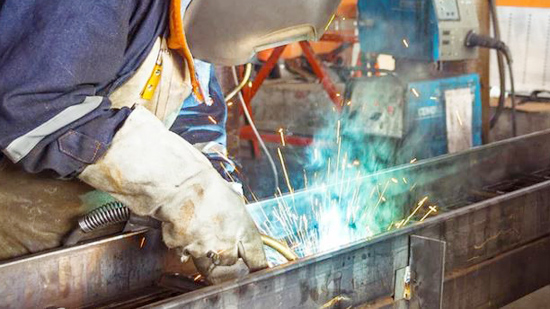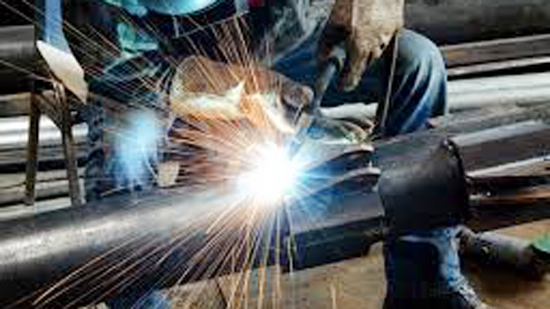Welders in the United States earn an average annual salary of $47,112. This figure may vary based on factors like experience, location, and specialization.
Welding offers a financially rewarding career path for those skilled in metalwork. In Texas, a good welder can expect competitive pay due to the demand for their expertise in various industries. Welding is a valuable profession that requires both physical labor and technical proficiency.
As a welder, one can enjoy the satisfaction of creating essential components while earning a respectable income. The specialized knowledge and hands-on skills needed in welding contribute to its reputation as a lucrative career choice for many individuals seeking stability and fulfillment in their work.

Image by oninstaffing
About Welder Earnings
Welder earnings vary depending on factors such as location and experience. Welders can earn a good income due to the demand for their specialized skills in industries like construction and manufacturing. If you’re considering a career in welding, it’s worth researching the average salaries in your area to get a better understanding of the earning potential.
Welding is a vital skill in various industries, and welders are in high demand due to their ability to create and repair metal structures. The earning potential for welders can vary based on several factors, including experience, location, and industry specialization. We will explore the factors influencing welder salaries and compare regional pay differences to provide a comprehensive overview of how much welders make annually.
Factors Influencing Welder Salaries
Several factors play a significant role in determining a welder’s salary. These include:
- Experience level: The more experience a welder has, the higher their earning potential.
- Specialization: Welders who specialize in certain techniques such as TIG welding or underwater welding may command higher salaries.
- Industry: Welders working in industries such as aerospace or manufacturing tend to earn higher salaries compared to those in general construction.
- Certifications: Holding specific welding certifications can lead to increased earning opportunities.
- Union membership: Being a part of a welders’ union can often result in better pay and benefits.
Comparing Regional Pay Differences
Welder salaries can vary significantly based on the region in which they work. For instance, welders in metropolitan areas or regions with a high demand for skilled labor may earn higher salaries than those in rural areas. Cost of living differences can impact the real value of a welder’s earnings in different regions. It’s important to consider these regional pay differences when evaluating the earning potential for welders in various locations.
Welding Specializations And Pay Scale
Welders earn competitive salaries based on specialization and experience. Annual pay scales vary, with top earners in specialized fields such as pipeline welding and underwater welding. Salary potential increases with certifications and advanced skills.
When it comes to the field of welding, there are various specializations that can lead to different pay scales. Whether you’re an aspiring welder or considering a career change, it’s important to understand the top-paying welding jobs and the industry demand for each specialization. Let’s take a closer look at the welding specializations and their corresponding pay scales.
Top-paying Welding Jobs
Underwater Welding
Underwater welders are highly skilled professionals who work in extreme conditions to repair and maintain structures below the water surface. Due to the risks involved and the specialized training required, underwater welders command top salaries in the welding industry.
Aerospace Welding
Aerospace welders play a crucial role in the manufacturing and maintenance of aircraft. Their expertise in working with lightweight materials and meeting strict quality standards makes them highly sought after. As a result, aerospace welding is another high-paying specialization.
Nuclear Welding
Nuclear welders work in power plants and other nuclear facilities, where precision and safety are of utmost importance. These welders undergo rigorous training to ensure the integrity and reliability of welded components in nuclear applications, making it a lucrative specialization.
Pipe Welding
Pipe welders specialize in joining pipes for various industries such as oil and gas, construction, and infrastructure. Their skills in welding and fitting pipes together are in high demand, especially in sectors that rely heavily on pipelines. Pipe welding offers competitive pay rates.
Industry Demand And Specialization
It’s important to consider the industry demand when choosing a welding specialization. Some sectors may have higher demand and offer better job opportunities, leading to higher salaries. For example, the oil and gas industry often requires skilled pipe welders, resulting in a higher demand and potential for increased earnings.
Specializations such as robotic welding, structural welding, and automotive welding also offer promising career prospects. With advancements in technology and the need for efficient and precise welding processes, welders with expertise in these areas can expect good job prospects and competitive pay.
In addition to specialization, factors such as experience, certifications, and geographical location can also impact a welder’s salary. Highly experienced welders with advanced certifications often command higher pay rates. Certain regions or states may have a higher demand for welders, leading to better job opportunities and higher wages.
Choosing the right welding specialization can greatly impact a welder’s earning potential. By considering the top-paying welding jobs and understanding the industry demand for each specialization, aspiring welders can make informed decisions to pursue a rewarding and well-compensated career in the field of welding.
Entry-level Vs. Experienced Welder Salaries
Curious about the earning potential in the welding industry? Let’s dive into the comparison between entry-level and experienced welder salaries to see how much welders make annually.
Starting Salaries For New Welders
Starting out as a welder, you can expect to earn around $40,000 annually. Entry-level welders typically begin their careers with a base salary, gaining experience as they work on various projects.
- Entry-level welders may start in apprenticeship programs.
- Salaries for new welders vary based on location and industry demand.
- Entry-level welders often receive on-the-job training.
Earnings Growth With Experience
As welders gain experience, their earning potential increases significantly. With time and expertise, experienced welders can earn upwards of $60,000 to $80,000 annually.
- Experienced welders often specialize in specific welding techniques.
- Certifications and advanced training can lead to higher pay rates.
- Experienced welders may take on supervisory roles, impacting their salaries.
Geographical Impact On Welder Income
State-by-state Salary Comparison
When it comes to the salary of welders, the geographical location plays a significant role in determining the income. Different states offer varied salary ranges for welders based on factors such as demand, cost of living, and industry requirements. Let’s take a closer look at the state-by-state salary comparison for welders across the United States.
Urban Vs. Rural Welding Salaries
Another essential factor that influences welder income is the distinction between urban and rural areas. Welders working in urban settings may command higher salaries due to increased demand and cost of living, while those in rural areas might experience different income levels based on local industry needs and economic conditions.
Certifications And Their Effect On Pay
When it comes to welding, certifications play a crucial role in determining a welder’s earning potential. Let’s explore how different certifications impact a welder’s salary.
Certified Vs. Non-certified Welders
Certification is a significant factor in a welder’s pay scale. Certified welders typically earn higher salaries than their non-certified counterparts. Certifications validate a welder’s skills and expertise, leading to increased job opportunities and higher pay rates.
Advanced Certifications And Earnings Potential
Advanced certifications, such as AWS or ASME, can significantly boost a welder’s earning potential. Welders with specialized certifications often command premium wages due to their advanced skills and industry recognition.
Employment Sectors And Welder Compensation
When it comes to welder compensation, understanding the different employment sectors and job types is crucial. Welders can find employment in both the private sector and government jobs, each offering its own set of advantages and compensation packages.
Private Sector Vs. Government Jobs
In the private sector, welders often work for companies involved in industries such as manufacturing, construction, and oil and gas. These companies may offer competitive salaries and benefits packages.
On the other hand, government jobs in sectors like defense, transportation, and infrastructure can provide stable employment with attractive benefits.
While private sector jobs may offer higher wages and potential for overtime pay, government jobs often come with the security of regular working hours and additional perks like healthcare and retirement benefits. It ultimately depends on the individual’s preferences and priorities.
Contract Work Vs. Full-time Employment
Another factor to consider when evaluating welder compensation is the type of employment: contract work or full-time employment. Contract work involves working on specific projects or assignments for a fixed duration, whereas full-time employment offers ongoing work with a single employer.
Contract work can be appealing for welders who prefer flexibility and variety in their work. However, it may come with less job security and fewer benefits compared to full-time employment. Full-time employment, on the other hand, provides stability and a steady income, along with benefits like health insurance, retirement plans, and paid time off.
Comparing Compensation Packages
To get a better understanding of the compensation welders can expect, let’s compare some average salary figures. According to data from salary.com, the average annual salary for a Welder I in the United States is $47,112. Compensation can vary based on factors such as location, experience, and industry.
For example, welders in Texas can earn an average salary of around $45,000 per year, while those in California may earn higher salaries due to the higher cost of living. Welders working in specialized fields like pipeline welding or TIG welding may also command higher wages due to the advanced skills required.
It’s important to note that these figures are just averages, and individual salaries may vary based on factors specific to each job and employer. Additionally, welders can increase their earning potential through additional certifications, experience, and specialization.
When considering a career as a welder, it’s essential to understand the various employment sectors and job types available, as they can significantly impact compensation.
Whether working in the private sector or government jobs, or choosing between contract work and full-time employment, welders have the opportunity to earn a competitive salary and enjoy the benefits that come with their chosen career path.
Benefits And Perks Beyond Salary
Welding offers not only a competitive salary but also a range of benefits and perks that contribute to a fulfilling career. From healthcare and retirement plans to overtime and hazard pay, welders can enjoy various additional advantages beyond their annual income.
Healthcare And Retirement Plans
Welders often have access to comprehensive healthcare plans, including medical, dental, and vision coverage. Additionally, many employers offer retirement plans such as 401(k) or pension options, providing financial security for the future.
Overtime And Hazard Pay
Welders may have the opportunity to earn additional income through overtime work, especially during busy periods or urgent projects. Moreover, they often receive hazard pay for working in potentially dangerous environments, acknowledging the physical risks associated with the profession.
Real-world Welder Earnings Insights
If you’re considering a career in welding, one of the top questions on your mind is likely, “how much do welders make?” Fortunately, there is a wealth of information available on the subject, including personal testimonies from welders themselves and various salary surveys and reports. Here, we’ll explore some real-world earnings insights to help you get a better idea of what you can expect to earn as a welder.
Personal Testimonies From Reddit
One of the best ways to get a sense of what welders earn in the real world is to read personal testimonies from those who are already in the field. Reddit, a popular online community, is a great resource for this. Here are a few examples of what welders are saying:
- “I started out at $15/hr in a fab shop, then went to $18/hr at a pipe yard, and now I make $23/hr welding pipe on a pipeline.”
- “I work in a union shop in the Midwest and make $29/hr. Plus benefits and overtime. Last year I made 85k.”
- “I’m in a non-union shop in southern California and make $23/hr. I’ve been welding for 8 years and have a lot of experience with TIG welding aluminum.”
Salary Surveys And Reports
Another way to get a sense of what welders earn is to consult salary surveys and reports. Here are a few examples:
| Source | Median Annual Salary |
|---|---|
| Bureau of Labor Statistics | $42,490 |
| Payscale | $18.46/hr |
| Glassdoor | $41,380 |
Note that these figures are just averages and that individual salaries can vary widely depending on factors such as experience, location, and industry. However, they can give you a general idea of what to expect.
Future Outlook For Welder Salaries
The future outlook for welder salaries appears promising, with potential for substantial annual earnings. Welders can make a lucrative income due to the labor-intensive nature of the work and the specialized knowledge required. This career choice offers the opportunity to work with metal in industrial or construction settings, making it a financially rewarding path.
Industry Trends Affecting Pay
Welding is a growing industry, with the Bureau of Labor Statistics predicting a 3% increase in employment opportunities for welders between 2019 and 2029. This growth can be attributed to the increased demand for skilled welders in various sectors such as construction, manufacturing, and infrastructure.
The pay scale for welders is subject to various factors such as location, industry, experience, and skill level. For instance, welders in the oil and gas industry tend to earn higher salaries than those in the construction sector due to the hazardous nature of the job.
Educational Pathways To Higher Earnings
Education and training are crucial in the welding profession, with various certification programs available for welders to enhance their skills and knowledge. Welders who invest in their education and training tend to earn higher salaries than those who rely solely on their experience.
For instance, Certified Welding Inspectors (CWI) earn an average of $73,000 per year, compared to the average salary of $42,000 for welders with no certification.
Welders who specialize in certain areas such as underwater welding or aerospace welding tend to earn higher salaries due to the unique skills required for those roles. In conclusion, the future outlook for welder salaries is promising, with increasing employment opportunities and the potential for higher earnings through education and specialization.
It is important to note that the pay scale for welders is subject to various factors and can vary greatly depending on the industry, location, and skill level.
Maximizing Income As A Welder
Welding is a rewarding profession, not only in terms of the hands-on work and creative fulfillment it offers, but also in its potential for substantial earnings. By strategically navigating the various avenues for maximizing income, welders can secure a lucrative career path with opportunities for growth and advancement.
Negotiating Salaries And Raises
When entering the workforce or seeking new opportunities, negotiating salaries is a crucial step in maximizing income. Researching industry standards and leveraging one’s skills and experience during negotiations can lead to higher compensation packages.
Consistently seeking out performance reviews and advocating for raises based on demonstrated value can further enhance earning potential.
Continuing Education And Skill Development
Investing in continuing education and skill development is paramount for welders aiming to maximize their income. Pursuing advanced certifications, such as becoming a Certified Welding Inspector (CWI), can open doors to higher-paying positions.
Acquiring expertise in specialized welding techniques, such as TIG or pipeline welding, can make welders more valuable and in demand.
Conclusion
To sum up, welding can be a lucrative career choice due to its labor-intensive nature and specialized knowledge required. The salary of a welder varies depending on factors such as location, experience, and industry. According to the data collected, welders in Texas earn an average salary of $47,112 annually.
With experience and expertise, welders can earn significantly higher salaries. So, if you have a passion for working with metal and creating components, welding could be a great career option for you.

I’m Darrell Julian, the founder, lead writer, and hands-on welding enthusiast behind ArcWeldingPro.com. With more than 15 years of real-world welding experience, I created this platform to share what I’ve learned in the field, in the shop, and in the heat of the arc.



